Heim >Backend-Entwicklung >Python-Tutorial >So schreiben Sie ein Python-Inspektionsskript
So schreiben Sie ein Python-Inspektionsskript
- PHPznach vorne
- 2023-05-10 13:22:061717Durchsuche
Methode 1. Verwenden Sie die Systemmethode des OS-Moduls
os.system (cmd). Der Rückgabewert ist der Statuscode, der nach der Ausführung des Shell-Befehls zurückgegeben wird.
0-- gibt an, dass der Shell-Befehl ausgeführt wurde erfolgreich ausgeführt,
256-- Zeigt an, dass die Shell nicht gefunden wurde
Diese Methode eignet sich für Szenarien, in denen der Shell-Befehl keinen Inhalt ausgeben muss.
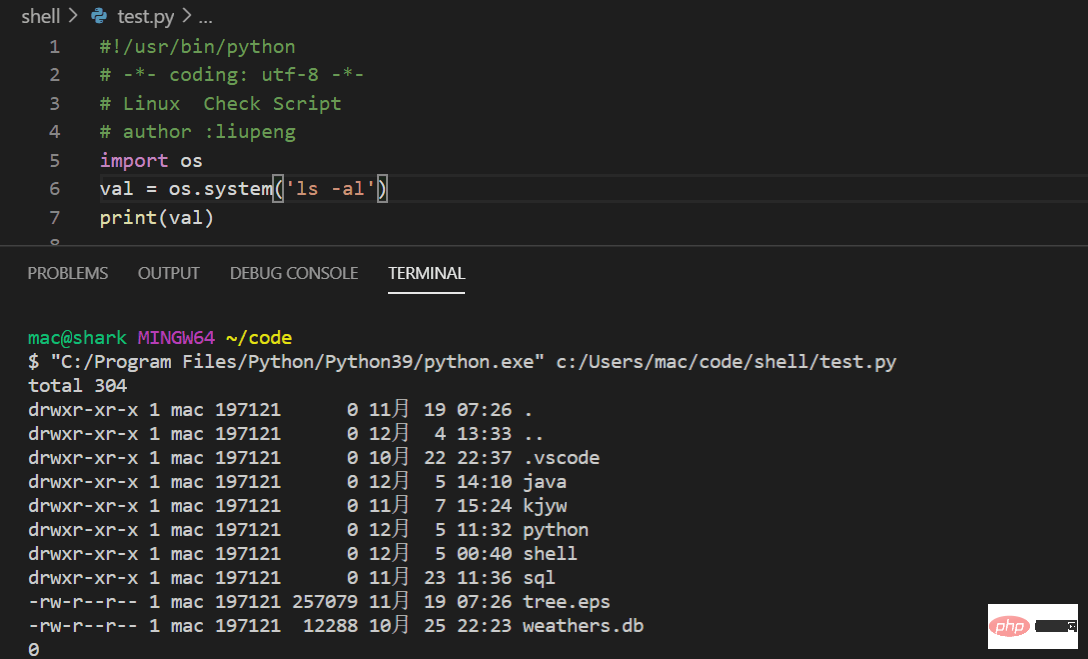
Sie können bei Bedarf die Methode read() oder readlines() verwenden Inhalte abrufen. Zum Beispiel:
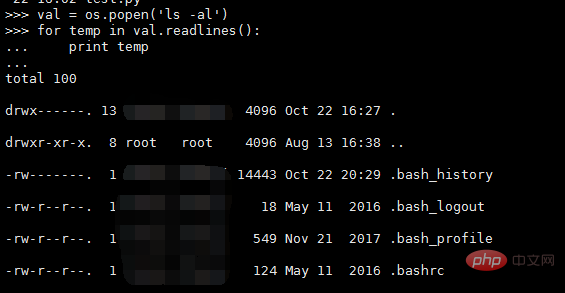
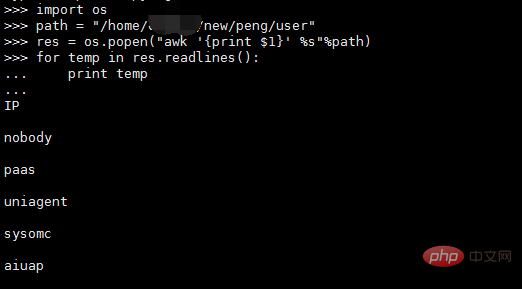
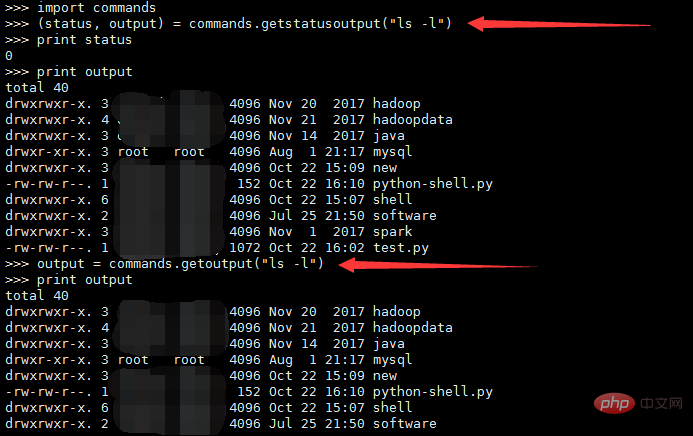
 ermöglicht Beim Erstellen eines Unterprozesses können Sie den Unterprozess und seine Eingabe-, Ausgabe- und Fehlerausgabepipelines angeben. Nach der Ausführung können Sie die Ausgabeergebnisse und den Ausführungsstatus abrufen.
ermöglicht Beim Erstellen eines Unterprozesses können Sie den Unterprozess und seine Eingabe-, Ausgabe- und Fehlerausgabepipelines angeben. Nach der Ausführung können Sie die Ausgabeergebnisse und den Ausführungsstatus abrufen.
(1) subprocess.run(): Eine neue Funktion in Python3.5, führt den angegebenen Befehl aus, wartet auf die Ausführung des Befehls und gibt eine Instanz der CompletedProcess-Klasse zurück, die das Ausführungsergebnis enthält.
(2) subprocess.call(): Führen Sie den angegebenen Befehl aus und geben Sie den Befehlsausführungsstatus zurück. Die Funktion ähnelt os.system (cmd).
(3) subprocess.check_call(): Eine neue Funktion in Python2.5, führt den angegebenen Befehl aus und gibt einen Statuscode zurück, wenn die Ausführung erfolgreich ist, andernfalls wird eine Ausnahme ausgelöst.
Beschreibung: subprocess.run(args, *, stdin=None, input=None, stdout=None, stderr=None, shell=False, timeout=None, check=False, universal_newlines=False)
subprocess.call( args, *, stdin=None, stdout=None, stderr=None, shell=False, timeout=None)
subprocess.check_call(args, *, stdin=None, stdout=None, stderr=None, shell=False, timeout=Keine)
args: Zeigt Shell-Anweisungen an, wenn die Shell-Anweisungen in Zeichenfolgenform angegeben werden, z. B. „ls -l“, müssen Sie Shell = True festlegen. Andernfalls werden Shell-Variablen standardmäßig in Array-Form ausgedrückt, z. B. „ls“, „-l“.
Wenn Sie komplexere Shell-Anweisungen verwenden, können Sie zunächst die Methode shlex.split() des Shlex-Moduls verwenden, um die Formatierung des Befehls zu unterstützen, und ihn dann an die Methode run() oder Popen übergeben.
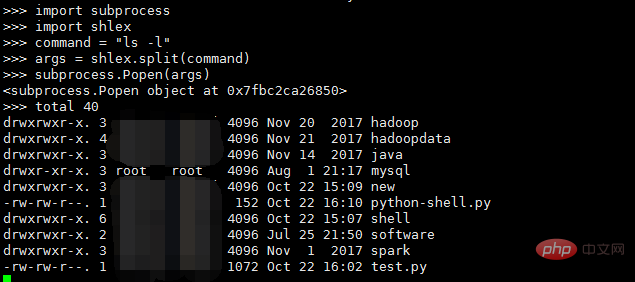
# Stubs for subprocess
# Based on http://docs.python.org/2/library/subprocess.html and Python 3 stub
from typing import Sequence, Any, Mapping, Callable, Tuple, IO, Union, Optional, List, Text
_FILE = Union[None, int, IO[Any]]
_TXT = Union[bytes, Text]
_CMD = Union[_TXT, Sequence[_TXT]]
_ENV = Union[Mapping[bytes, _TXT], Mapping[Text, _TXT]]
# Same args as Popen.__init__
def call(args: _CMD,
bufsize: int = ...,
executable: _TXT = ...,
stdin: _FILE = ...,
stdout: _FILE = ...,
stderr: _FILE = ...,
preexec_fn: Callable[[], Any] = ...,
close_fds: bool = ...,
shell: bool = ...,
cwd: _TXT = ...,
env: _ENV = ...,
universal_newlines: bool = ...,
startupinfo: Any = ...,
creationflags: int = ...) -> int: ...
def check_call(args: _CMD,
bufsize: int = ...,
executable: _TXT = ...,
stdin: _FILE = ...,
stdout: _FILE = ...,
stderr: _FILE = ...,
preexec_fn: Callable[[], Any] = ...,
close_fds: bool = ...,
shell: bool = ...,
cwd: _TXT = ...,
env: _ENV = ...,
universal_newlines: bool = ...,
startupinfo: Any = ...,
creationflags: int = ...) -> int: ...
# Same args as Popen.__init__ except for stdout
def check_output(args: _CMD,
bufsize: int = ...,
executable: _TXT = ...,
stdin: _FILE = ...,
stderr: _FILE = ...,
preexec_fn: Callable[[], Any] = ...,
close_fds: bool = ...,
shell: bool = ...,
cwd: _TXT = ...,
env: _ENV = ...,
universal_newlines: bool = ...,
startupinfo: Any = ...,
creationflags: int = ...) -> bytes: ...
PIPE = ... # type: int
STDOUT = ... # type: int
class CalledProcessError(Exception):
returncode = 0
# morally: _CMD
cmd = ... # type: Any
# morally: Optional[bytes]
output = ... # type: Any
def __init__(self,
returncode: int,
cmd: _CMD,
output: Optional[bytes] = ...) -> None: ...
class Popen:
stdin = ... # type: Optional[IO[Any]]
stdout = ... # type: Optional[IO[Any]]
stderr = ... # type: Optional[IO[Any]]
pid = 0
returncode = 0
def __init__(self,
args: _CMD,
bufsize: int = ...,
executable: Optional[_TXT] = ...,
stdin: Optional[_FILE] = ...,
stdout: Optional[_FILE] = ...,
stderr: Optional[_FILE] = ...,
preexec_fn: Optional[Callable[[], Any]] = ...,
close_fds: bool = ...,
shell: bool = ...,
cwd: Optional[_TXT] = ...,
env: Optional[_ENV] = ...,
universal_newlines: bool = ...,
startupinfo: Optional[Any] = ...,
creationflags: int = ...) -> None: ...
def poll(self) -> int: ...
def wait(self) -> int: ...
# morally: -> Tuple[Optional[bytes], Optional[bytes]]
def communicate(self, input: Optional[_TXT] = ...) -> Tuple[Any, Any]: ...
def send_signal(self, signal: int) -> None: ...
def terminate(self) -> None: ...
def kill(self) -> None: ...
def __enter__(self) -> 'Popen': ...
def __exit__(self, type, value, traceback) -> bool: ...
# Windows-only: STARTUPINFO etc.
STD_INPUT_HANDLE = ... # type: Any
STD_OUTPUT_HANDLE = ... # type: Any
STD_ERROR_HANDLE = ... # type: Any
SW_HIDE = ... # type: Any
STARTF_USESTDHANDLES = ... # type: Any
STARTF_USESHOWWINDOW = ... # type: Any
CREATE_NEW_CONSOLE = ... # type: Any
CREATE_NEW_PROCESS_GROUP = ... # type: AnyDas obige ist der detaillierte Inhalt vonSo schreiben Sie ein Python-Inspektionsskript. Für weitere Informationen folgen Sie bitte anderen verwandten Artikeln auf der PHP chinesischen Website!

